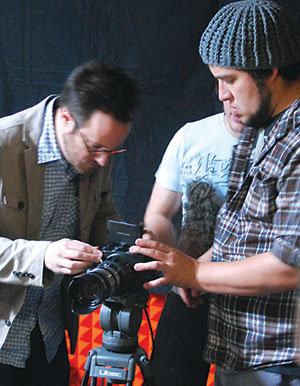Film program is all about making movies
January 1, 2013

For Jeremy Nielsen, the fledgling film program at Central Wyoming College is all about making movies and he puts cameras into the hands of his students the very first day.
“We are focusing on film production rather than critical studies,” said Nielsen, who has been on the CWC communication faculty since fall of 2012. “We make a film on the first day of class.”
At the conclusion of the 2013 spring semester, Nielsen hosted a public film festival, showcasing 27 student films. “It was a pretty prolific group,” he said of the results of his first year at CWC.
Nielsen grew up in Salt Lake City and fell in love with making movies in junior high. Using his family home as a studio to crank out would-be box office hits, Jeremy began focusing on a more realistic pursuit and enrolled in the film program at the University of Utah. While his film career was delayed for several years when he worked in the music industry, he recognized the need to get a “real job” after touring the country with a band as its bass player.
He began working in the Salt Lake City film industry and taught courses at a juvenile detention center. He later worked for a non-profit organization that worked with underserved youth through film education. There he discovered his love of teaching.
All the while, Jeremy continued in the film industry, working as a cinematographer, director of photography, editor, and as a composer of musical scores. He co-produced an award-winning film Twice Today, and his most recent film, Darkroom is now available on DVD.
Jeremy recognized that working on movie sets 16 hours every day of the week wasn’t going to work for his growing family. He went back to to work on his master’s degree, expanding his repertoire to include video game production.
CWC added film to its radio, television and communication program, allowing students to complete general education requirements and then select an emphasis. Many of his students dabble in each of the areas though Nielsen believes film is vastly different from television.
“TV is all about getting a fleeting shot,” he explained. “Film is slower, more cumbersome.” Though both use similar equipment, it’s very different. Students of film require patience.
He teaches his students what is basically required in the production of a film, from writing to editing to directing. He has also added in screen writing and incorporated the film festival into the program, too.
To generate more interest in film and his program, Jeremy is offering a course in the fall on horror films, a genre that has endured for more than a hundred years. “It is strangely looked down upon and respected at the same time,” Jeremy said of horror pictures. “If I would have picked musicals, there would be much less interest.”
With CWC having the only film program in Wyoming, Nielsen intends to recruit at high schools teaching film. He was a judge at the Wyoming High School Film Festival and saw some talent.
Nielsen has been appointed to the Wyoming Film Industry Incentive Review Committee, a board of five which entices filmmakers to the Cowboy State by offering rebates of up to 15 percent of the cost of project.
“It makes me aware of what’s going on film-wise in the state,” he said.
Nielsen worked as a cinematographer on two feature films this past summer. “In the film world, technology changes so quickly,” he said, explaining his need to work to keep up.